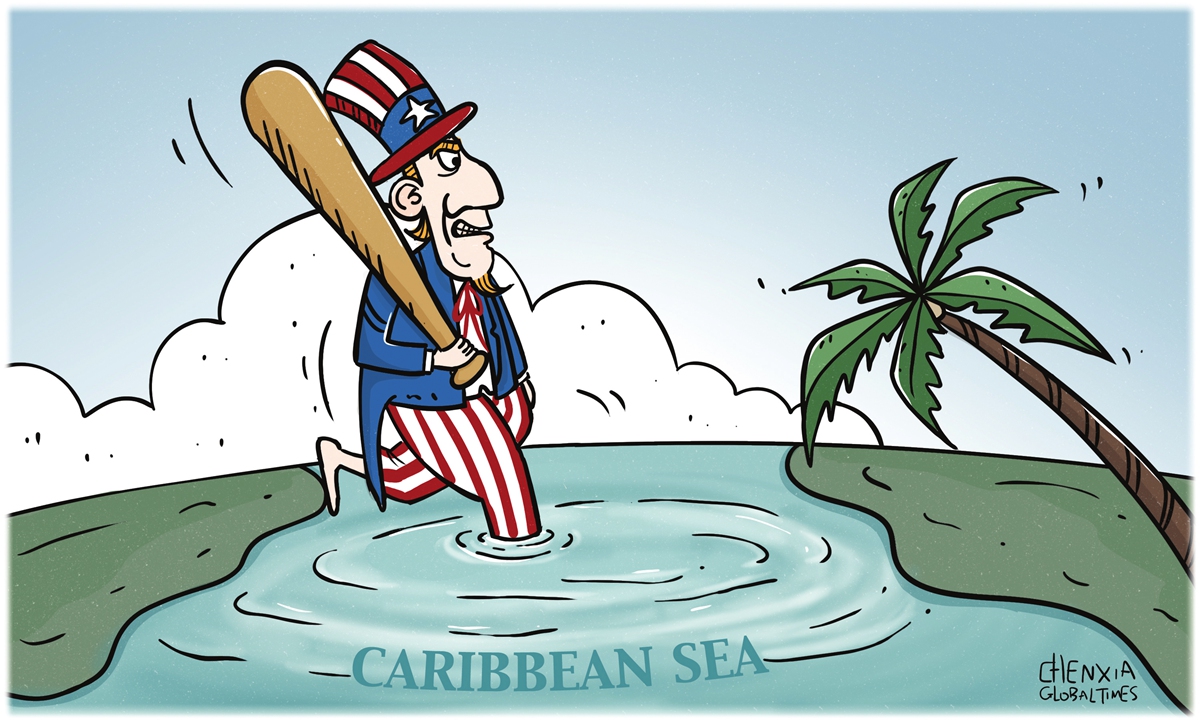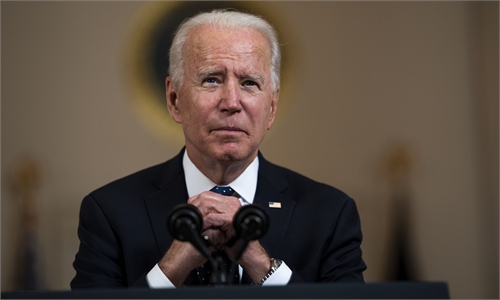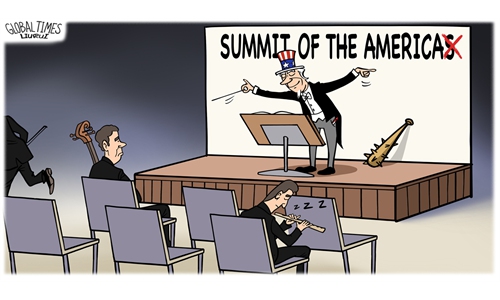
Summit of the Americas Illustration: Chen Xia/GT
The Ninth Summit of the Americas is due to take place from June 6 to 10 in Los Angeles, marking the first time it has been hosted in the US since Bill Clinton created the event in 1994. It comes as Joe Biden, 16 months into his presidency, is working on multiple fronts to rebuild a stable US-led imperialist alliance following the erratic legacy of Donald Trump.
When the Biden administration proclaimed that that "diplomacy is back" and that the US would "repair its alliances," this was merely a promise to carry forward the century-old project of domination and hegemonism. So much is obvious from the proposed expansion of NATO, attempts to weaken Russia, the creation of AUKUS, the revival of the Quad, the encouraging of Taiwanese secessionism, and the recent launch of the Indo-Pacific Economic Framework for Prosperity.
In this context, the Summit provides an opportunity for the US to reassert its leadership in what it has long considered its backyard for centuries. But things are not going according to plan. In response to a US announcement that the US hasn't invited the governments of Venezuela and Nicaragua and is only considering inviting a Cuban representative to the summit as an observer instead of as a full participant, multiple leaders in the region declared they refuse to attend.
Mexican President Andrés Manuel López Obrador stated that: "If everyone is not invited, I will not go," questioning if it was truly a summit, or just one of the friends of the US. Bolivian President Luis Arce echoed the sentiment of his Mexican counterpart, saying that he would not participate if the exclusion took place. Likewise Xiomara Castro, the recently-elected leftist President of Honduras stated: "If all the nations aren't there, it isn't a Summit of the Americas." It may well be that the entire CARICOM - an intergovernmental organization with 15 member states in the Caribbean - boycotts the Summit.
Biden is so concerned about the collapse of the Summit that he dispatched his envoy Christopher Dodd to Argentina to convince President Alberto Fernández to attend. Fernández did not confirm whether or not he would go to the Summit, but he did take the opportunity to reproach Dodd and condemned the exclusion, saying "it's shameful that the US maintains a blockade against Cuba and Venezuela"- with Venezuela's senior politician Diosdado Cabello rejecting it as a "summit of the gringos."
The Monroe Doctrine, first articulated by president James Monroe in 1823, denounced European colonialism and interference in the Western Hemisphere, not on the basis of any anti-colonial principle but as an assertion of the US' exclusive rights to exploit the continent. Since that time, the US' relationship in Latin America has largely been characterized by neocolonialism, and the region's land, natural resources, labor and markets have been subservient to the needs of US monopoly capital.
When the US has been unable to secure its interests through quiet pressure and economic coercion, it has not hesitated to use force. This has included a well documented history of military coups including in Guatemala, Brazil, Chile and Argentina, as well as an attempted invasion of Cuba, a civil war in Nicaragua, as well as recent efforts aimed at Venezuela and Brazil.
But the US cannot stem the tide of multipolarity.
The peoples of the region are simply not willing to accept the Monroe Doctrine any longer. Speaking in January this year, President Biden thought he was presenting Latin America a valuable gift by upgrading its status from "backyard" to "frontyard." However, the peoples of the region are no longer willing to be any type of yard. China's rise has been important to Latin America to move away from the US, with bilateral trade increasing from just $12 billion in 2000 to $315 billion today. A majority of countries in the Latin American and Caribbean region have signed up to the Belt and Road Initiative. As US peace activist Medea Benjamin noted recently: "China has surpassed the US as the number one trading partner, giving Latin American countries more freedom to defy the United States."
As trade, investment and diplomatic ties with China have grown, Latin America has a historic opportunity to climb the ladder of sovereign development, improve the living standards of its people, and affirm its status as a key player in an increasingly multipolar world.
As spokesperson of the Chinese Ministry of Foreign Affairs Wang Wenbin stated recently, Latin America is neither a frontyard nor a backyard of the US, "and the Summit of the Americas is not the Summit of the United States of America." If the US wants to improve its relationship with the countries of Latin America and the Caribbean, it should follow China's example and adopt an international relations strategy based on mutual respect, mutual benefit, equal treatment and non-interference. In short, it should give up on the Project for a New American Century and come to terms with humanity's trajectory away from hegemonism.
The author is a British author and independent political commentator. opinion@globaltimes.com.cn


